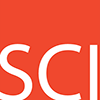How do we teach science? Too often, it’s all about memorizing facts and mastering equations. This is how this works, and that’s how that works. Questions? Okay, test on Thursday.
We often teach history in much the same way—as the rote memorization of dates and events that happened in the past and have no relevance today, other than the test on Thursday.
Why?
Maybe part of the reason is we don’t actually understand these subjects ourselves, or we aren’t inspired by them. But history and science are rich adventures that make the most lurid soap operas seem tame by comparison. When we don’t realize this and focus instead on facts and equations, dates and events, we lose all this texture—we lose the human connection, the stories and the adventures that really help explain the past. And today more than ever, as our history gets rewritten by social media and our science gets distorted by political partisans, it’s important to understand where we came from, how we got here, the common experiences that connect us, and why we believe what we believe today.
This connection is part of the reason why science fiction is so effective and appealing: it inspires and engages us, not only by helping us imagine how science can change the world, or by building a bridge between past, present, and future, but by telling stories, which are the single most effective form of communication.
But where exactly do science stories come from? Biographies for one. Thousands of amateur astronomers like me were inspired growing up by the biography of Clyde Tombaugh (in The Search for Planet X), the young citizen scientist who discovered Pluto. “Why I work in science” stories also help, like those on SCI’s Profile Series page. And videos explaining science itself can also be a storytelling artform (think Neil de Grasse Tyson or Bill Nye the Science Guy). There is no shortage of video storytelling in science.
But in terms of really making a connection between past and present, and understanding why we did what we did and how we got to where we are today, learning more about the history of science should also be high on our to-do list. This field of study is broad—there are many academic treatments of this subject, as well as many popular books written from many different perspectives, all with a wide range of readability. There is a subset of books in this field, though, that can help provide a better understanding of where science came from, and what it has meant to society. Within this subset, there are at least a dozen history of science books that should be on your shelves, all very interesting and all eminently readable (and not all dealing with the history of science head-on but as important subplots). These books are listed here in order from the oldest time periods covered (from the start of the scientific revolution) to the most recent:
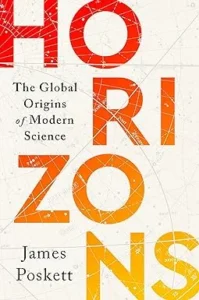 , by James Poskett, and The Light Ages by Seb Falk. Poskett and Falk both take umbrage with the idea that the Scientific Revolution started in Europe in the mid-1500s, and instead claim it started centuries earlier in many parts of the world where exploration and innovation were happening at a breakneck pace. This knowledge made its way to Europe via trade routes, and European philosophers then appropriated this knowledge and repackaged it as science. Poskett’s and Falk’s explorations are fascinating, uncovering a wealth of discovery that was happening around the world during the “dark ages” and describing how much sharing of knowledge occurred. As the history of science gets rewritten, we’ll need to do a better job of giving credit where credit is due. But both authors miss the point that there’s a huge difference between innovation and science. The scientific method—carefully and rigorously testing hypotheses, sharing data, replicating findings, and using this knowledge to explain and reform the world around them—didn’t start in an organized fashion until mid-1500s Europe, and really needed a few high-profile jolts like Columbus’s 1492 expedition, and Copernicus’s 1543 treatise on a sun-centered universe to take hold. Scattered facts and discoveries from around the world were laying the foundation for what turned into a revolutionary social movement in Europe, but nowhere else in the world.
, by James Poskett, and The Light Ages by Seb Falk. Poskett and Falk both take umbrage with the idea that the Scientific Revolution started in Europe in the mid-1500s, and instead claim it started centuries earlier in many parts of the world where exploration and innovation were happening at a breakneck pace. This knowledge made its way to Europe via trade routes, and European philosophers then appropriated this knowledge and repackaged it as science. Poskett’s and Falk’s explorations are fascinating, uncovering a wealth of discovery that was happening around the world during the “dark ages” and describing how much sharing of knowledge occurred. As the history of science gets rewritten, we’ll need to do a better job of giving credit where credit is due. But both authors miss the point that there’s a huge difference between innovation and science. The scientific method—carefully and rigorously testing hypotheses, sharing data, replicating findings, and using this knowledge to explain and reform the world around them—didn’t start in an organized fashion until mid-1500s Europe, and really needed a few high-profile jolts like Columbus’s 1492 expedition, and Copernicus’s 1543 treatise on a sun-centered universe to take hold. Scattered facts and discoveries from around the world were laying the foundation for what turned into a revolutionary social movement in Europe, but nowhere else in the world.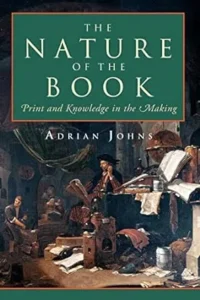 by Adrian Johns. Johns’s book starts in the late 1300s before the printing press was invented. He describes how the world shared knowledge before the press came along, and the hugely transformative impact the press made when it came along in the mid- to-late 1400s. More profound than even today’s Internet, the printing press democratized knowledge, and made possible the widespread recording and transmission of knowledge in ways that simply didn’t exist before. The competition for publishing became intense, new ideas sprang up everywhere, new ways of thinking came to light, people clamored to own books and pamphlets and share ideas, and literacy and education spread. It’s hard to overstate how important and influential books became in changing society through the spread of knowledge (particularly science) and the enthusiasm for understanding.
by Adrian Johns. Johns’s book starts in the late 1300s before the printing press was invented. He describes how the world shared knowledge before the press came along, and the hugely transformative impact the press made when it came along in the mid- to-late 1400s. More profound than even today’s Internet, the printing press democratized knowledge, and made possible the widespread recording and transmission of knowledge in ways that simply didn’t exist before. The competition for publishing became intense, new ideas sprang up everywhere, new ways of thinking came to light, people clamored to own books and pamphlets and share ideas, and literacy and education spread. It’s hard to overstate how important and influential books became in changing society through the spread of knowledge (particularly science) and the enthusiasm for understanding.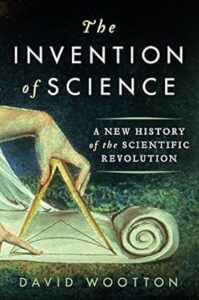 by David Wootton. Wooton’s description of the rise of the Scientific Revolution is a must-read for any scientist or historian. A journalist by training, Wooton writes a gripping tale of intrigue as famous men like Isaac Newton steal data and ideas from less famous men in order to further their careers, form a closed-door invitation-only club to share their ideas (The Royal Society), and scrap for financial advantage from their discoveries in an age before intellectual property rights existed (apart from being granted a favor from the king). The Scientific Revolution in Europe—even apart from the broader Enlightenment Period itself— was a rough and tumble world of proving that facts existed on the one hand, and then watching the bowling pins fly as this tumult was unleashed on a society still firmly in the grip of truth as defined by the Catholic Church. There are so many story lines to follow during this period, any one of which would make for a fantastic movie (attention Ridley Scott).
by David Wootton. Wooton’s description of the rise of the Scientific Revolution is a must-read for any scientist or historian. A journalist by training, Wooton writes a gripping tale of intrigue as famous men like Isaac Newton steal data and ideas from less famous men in order to further their careers, form a closed-door invitation-only club to share their ideas (The Royal Society), and scrap for financial advantage from their discoveries in an age before intellectual property rights existed (apart from being granted a favor from the king). The Scientific Revolution in Europe—even apart from the broader Enlightenment Period itself— was a rough and tumble world of proving that facts existed on the one hand, and then watching the bowling pins fly as this tumult was unleashed on a society still firmly in the grip of truth as defined by the Catholic Church. There are so many story lines to follow during this period, any one of which would make for a fantastic movie (attention Ridley Scott).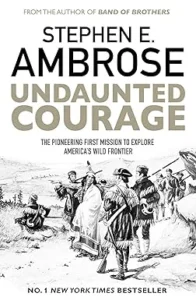 by Stephen Ambrose. Thomas Jefferson was a scientist, and his real interest in promoting the 1803 Lewis & Clark expedition was scientific. To this end, he secretly trained the expedition’s leader, Captain Meriwether Lewis, in how to be a botanist, and carefully planned the expedition so it could collect and return (throughout the voyage via courier) the scientific logs of the expedition, and the plant specimens it collected along with way. The Lewis & Clark expedition was ostensibly a voyage of discovery to map the territory obtained by the US in the Louisiana Purchase and to look for the fabled Northwest Passage waterway—this is how it was sold to Congress anyway. But in truth, it was one of the first and most thorough scientific expeditions of its time.
by Stephen Ambrose. Thomas Jefferson was a scientist, and his real interest in promoting the 1803 Lewis & Clark expedition was scientific. To this end, he secretly trained the expedition’s leader, Captain Meriwether Lewis, in how to be a botanist, and carefully planned the expedition so it could collect and return (throughout the voyage via courier) the scientific logs of the expedition, and the plant specimens it collected along with way. The Lewis & Clark expedition was ostensibly a voyage of discovery to map the territory obtained by the US in the Louisiana Purchase and to look for the fabled Northwest Passage waterway—this is how it was sold to Congress anyway. But in truth, it was one of the first and most thorough scientific expeditions of its time.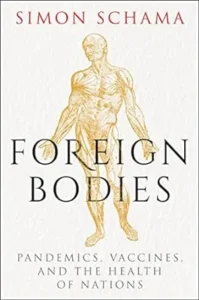 , by Simon Schama. Schama is a brilliant historian among brilliant historians. If you want to truly understand the horror of the French Revolution in a way that Les Misérables only hints at, read Schama’s Citizens. In Foreign Bodies, Schama dives into the 19th century drama that engulfed efforts to vaccinate populations around the world from the spread of smallpox, cholera, and the plague. Here, we see Poskett and Falk’s world of “science” colliding with the Royal Society’s club of know-it-alls. Life-saving knowledge was available—smallpox vaccination methods had been refined in China, India, and Turkey for hundreds of years if not longer—but these methods were ignored by the European medical establishment because they came from the wrong race of people, because religious leaders objected to tampering with the will of God, and because political leaders were more interested in following public opinion than saving lives. If you think the social pushback against COVID-19 vaccines is a new phenomenon, read this book. Everything old is new again. We also learn about the heroes history has forgotten, like Waldemar Haffkine, who created cholera and plague vaccines that worked and were saving millions of lives in India, but who was hounded into retirement because the bureaucracy of science was controlled by people who didn’t understand science, and also because of rampant antisemitism (Haffkine’s troubles began at around the same time as the Dreyfuss affair).
, by Simon Schama. Schama is a brilliant historian among brilliant historians. If you want to truly understand the horror of the French Revolution in a way that Les Misérables only hints at, read Schama’s Citizens. In Foreign Bodies, Schama dives into the 19th century drama that engulfed efforts to vaccinate populations around the world from the spread of smallpox, cholera, and the plague. Here, we see Poskett and Falk’s world of “science” colliding with the Royal Society’s club of know-it-alls. Life-saving knowledge was available—smallpox vaccination methods had been refined in China, India, and Turkey for hundreds of years if not longer—but these methods were ignored by the European medical establishment because they came from the wrong race of people, because religious leaders objected to tampering with the will of God, and because political leaders were more interested in following public opinion than saving lives. If you think the social pushback against COVID-19 vaccines is a new phenomenon, read this book. Everything old is new again. We also learn about the heroes history has forgotten, like Waldemar Haffkine, who created cholera and plague vaccines that worked and were saving millions of lives in India, but who was hounded into retirement because the bureaucracy of science was controlled by people who didn’t understand science, and also because of rampant antisemitism (Haffkine’s troubles began at around the same time as the Dreyfuss affair).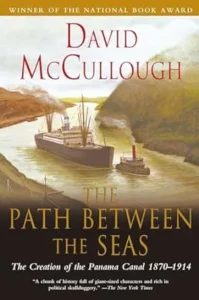 , by David McCullough. McCollough is a prolific historian who has written on many subjects. In this novel, he takes on the story of the Panama Canal, one of the most important economic engines in the history of the United States. On its face, this is the story of a massive engineering challenge unlike anything the world had seen to date. But underneath, it’s a story of bacteriology. The French were the first to attempt the canal project, and poured their national pride and finances into this effort. But hundreds of the finest engineers in France along with thousands of French and international workers were killed by malaria while trying to build the canal. No one knew how to stop this illness, and the death rates were as difficult to overcome as the technical challenges. When the Americans took over the building project (through legal trickery) in 1904, their first priority was to get malaria under control. And to do this, one of the heroes from Schama’s book—Ronald Ross—came to the rescue. Ross discovered that malaria was spread by mosquitos. Following up on this discovery, the US Army’s Col. William Gorgas led an effort to eradicate mosquitos from the canal area—primarily by draining swamps and using screens. This effort quickly reduced malaria deaths and allowed the canal to be completed with minimal additional loss of life.
, by David McCullough. McCollough is a prolific historian who has written on many subjects. In this novel, he takes on the story of the Panama Canal, one of the most important economic engines in the history of the United States. On its face, this is the story of a massive engineering challenge unlike anything the world had seen to date. But underneath, it’s a story of bacteriology. The French were the first to attempt the canal project, and poured their national pride and finances into this effort. But hundreds of the finest engineers in France along with thousands of French and international workers were killed by malaria while trying to build the canal. No one knew how to stop this illness, and the death rates were as difficult to overcome as the technical challenges. When the Americans took over the building project (through legal trickery) in 1904, their first priority was to get malaria under control. And to do this, one of the heroes from Schama’s book—Ronald Ross—came to the rescue. Ross discovered that malaria was spread by mosquitos. Following up on this discovery, the US Army’s Col. William Gorgas led an effort to eradicate mosquitos from the canal area—primarily by draining swamps and using screens. This effort quickly reduced malaria deaths and allowed the canal to be completed with minimal additional loss of life.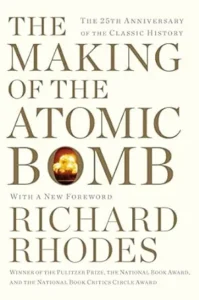 , by Richard Rhodes. Science took a detour in the mid-1900s with the Manhattan Project. Instead of being used for the benefit of mankind, science was now being nationalized, mobilized and weaponized (the movie Oppenheimer only touches on the personalities, intrigue and complexity of this effort—technical, scientific, social and political). Science has never really recovered from this relationship. Blasting out of the post-WWII era, science continued to be tightly bound to government needs and funding, subject to the funding whims, control, and oversight of non-scientist administrators (a peril first highlighted in Schama’s book about 19th century vaccination efforts). This has been both good and bad—good in the sense that government took a much stronger interest in science than before, bad in the sense that this interest in science distorted the way that science was henceforth conducted and incentivized, and this distortion continues to bedevil science today (Vannevar Bush, in his 1945 report to President Truman—Science, the Endless Frontier—first laid the groundwork for this new relationship between science and society).
, by Richard Rhodes. Science took a detour in the mid-1900s with the Manhattan Project. Instead of being used for the benefit of mankind, science was now being nationalized, mobilized and weaponized (the movie Oppenheimer only touches on the personalities, intrigue and complexity of this effort—technical, scientific, social and political). Science has never really recovered from this relationship. Blasting out of the post-WWII era, science continued to be tightly bound to government needs and funding, subject to the funding whims, control, and oversight of non-scientist administrators (a peril first highlighted in Schama’s book about 19th century vaccination efforts). This has been both good and bad—good in the sense that government took a much stronger interest in science than before, bad in the sense that this interest in science distorted the way that science was henceforth conducted and incentivized, and this distortion continues to bedevil science today (Vannevar Bush, in his 1945 report to President Truman—Science, the Endless Frontier—first laid the groundwork for this new relationship between science and society).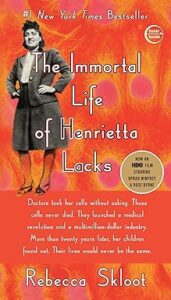 , by Rebecca Skloot. World War II fundamentally changed medical research in the US as well. For one, funding for research increased dramatically, along with oversight for this increased funding. But medical research was still the Wild West compared to today. Our understanding of patient rights, the global agreements to protect these rights, and our systems for how to rigorously and ethically conduct medical research were all still very limited. In this science biography, Skloot recounts the history of Henritta Lacks, an African-American woman treated for cancer in the Jim Crow section of Johns Hopkins University and whose cell line (HeLa cells) were used and reused for decades without her permission to create the cancer treatments we have today, all without acknowledgement or compensation. It’s important to read and remember stories like this (as well as forced sterilizations, Tuskegee, and more) so we can atone for the sacrifices and transgressions we’ve made in the name of progress, understand how far we’ve come, and appreciate the importance of continuing to strive for the right balance between discovery and the human cost of discovery.
, by Rebecca Skloot. World War II fundamentally changed medical research in the US as well. For one, funding for research increased dramatically, along with oversight for this increased funding. But medical research was still the Wild West compared to today. Our understanding of patient rights, the global agreements to protect these rights, and our systems for how to rigorously and ethically conduct medical research were all still very limited. In this science biography, Skloot recounts the history of Henritta Lacks, an African-American woman treated for cancer in the Jim Crow section of Johns Hopkins University and whose cell line (HeLa cells) were used and reused for decades without her permission to create the cancer treatments we have today, all without acknowledgement or compensation. It’s important to read and remember stories like this (as well as forced sterilizations, Tuskegee, and more) so we can atone for the sacrifices and transgressions we’ve made in the name of progress, understand how far we’ve come, and appreciate the importance of continuing to strive for the right balance between discovery and the human cost of discovery.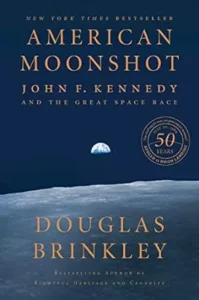 , by Douglas Brinkley. The nationalization and mobilization of science continued full blast under the Apollo program. Like the Manhattan Project before it, this program channeled American attention and resources toward science in ways never seen before and never seen since. First, we were falling behind the Russians in science, so teaching more science in schools was critical. Second, if the Russians got control of space (and they had taken a fast lead with Sputnik), they could wreak havoc on the world, so boosting the American space program was a national imperative. And third, in a world where communism and democracy were vying everywhere for global supremacy, it was imperative for democracy to win. If the communists reached the moon first, how could the Americans make the case that democracy was best? So, the Apollo program was much more than a moonshot effort. It was a race for exploration that doubled as a race for national pride, national achievement, and global security. If only there had been a longer range vision for the Apollo program that extended beyond just beating the Russians, we might have been able to keep launching rockets to reach Mars, build lunar bases, and more. We won the race to the moon, and then weren’t sure what to do next.
, by Douglas Brinkley. The nationalization and mobilization of science continued full blast under the Apollo program. Like the Manhattan Project before it, this program channeled American attention and resources toward science in ways never seen before and never seen since. First, we were falling behind the Russians in science, so teaching more science in schools was critical. Second, if the Russians got control of space (and they had taken a fast lead with Sputnik), they could wreak havoc on the world, so boosting the American space program was a national imperative. And third, in a world where communism and democracy were vying everywhere for global supremacy, it was imperative for democracy to win. If the communists reached the moon first, how could the Americans make the case that democracy was best? So, the Apollo program was much more than a moonshot effort. It was a race for exploration that doubled as a race for national pride, national achievement, and global security. If only there had been a longer range vision for the Apollo program that extended beyond just beating the Russians, we might have been able to keep launching rockets to reach Mars, build lunar bases, and more. We won the race to the moon, and then weren’t sure what to do next.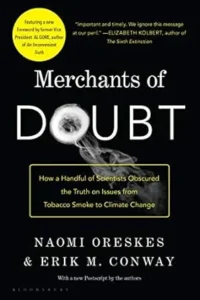 , by Naomi Oreskes and Erik Conway. In their landmark investigative book, Oreskes and Conway expose how bad actors in science were hired by industry over the last few decades to create cesspools disinformation that have cast doubt on science like the link between cigarettes and cancer, and between carbon emissions and climate change. This disinformation has persisted and metastasized today. Whereas we might be grateful for everything science has brought us in our age of bountiful technical and medical miracles, confidence in science is declining instead, we threaten to assassinate our country’s top medical leaders, and we ridicule our institutions of higher learning and the very idea of a college education. This reaction didn’t just appear out of thin air. It has been manufactured over decades by those with a political axe to grind. And in today’s world where most people get their news through social media, this axe poses more of a threat to society than ever before in history.
, by Naomi Oreskes and Erik Conway. In their landmark investigative book, Oreskes and Conway expose how bad actors in science were hired by industry over the last few decades to create cesspools disinformation that have cast doubt on science like the link between cigarettes and cancer, and between carbon emissions and climate change. This disinformation has persisted and metastasized today. Whereas we might be grateful for everything science has brought us in our age of bountiful technical and medical miracles, confidence in science is declining instead, we threaten to assassinate our country’s top medical leaders, and we ridicule our institutions of higher learning and the very idea of a college education. This reaction didn’t just appear out of thin air. It has been manufactured over decades by those with a political axe to grind. And in today’s world where most people get their news through social media, this axe poses more of a threat to society than ever before in history.A few other well-written books in this genre include:
There are many other books that could and should be included in this list, but if you’re just getting started down this path, these titles should keep you busy for a year. Not included here (but can be included for extra credit) are the science publications that themselves have made a huge impact on science and society, like On the Revolutions of Heavenly Spheres by Copernicus, Galileo’s Dialogue Concerning the Two Chief World Systems, Newton’s Principia, The Origin of Species by Charles Darwin, Silent Spring by Rachel Carson, and the innumerable scientific papers throughout the years that have announced the discovery of everything from electricity to relativity to x-rays, DNA, gene editing and the Higgs Boson particle. Understanding the impact this work has had on society should also be a minimum requirement for science educators and communicators (reading the work itself is a bonus). Also, this list doesn’t include the books and coursebooks that teach us science, or (as mentioned earlier) the biographies, videos, and science fiction stories that bring it all to life. And finally, of course, this list is far from complete—just Google “best books on the history of science” and you’ll find dozens of great resources that aren’t mentioned here.
The take home message is that we can do a better job of making science memorable, teachable, and relatable by incorporating more stories into science, because science isn’t just about facts and equations. Science is also about real people competing for discovery, searching for truth, and defying authority, hellbent on saving lives, being first, being best, defeating the enemy, and improving the human condition. By learning more about the history of science, we can gain a better understanding of what truly motivates science and scientists, why we need science, the vital role it has played in shaping our history, and the vital role science must continue to play in our future.
Glenn is Executive Director of the Science Communication Institute and Program Director for SCI’s global Open Scholarship Initiative. You can reach him at ghampson@sci.institute.
